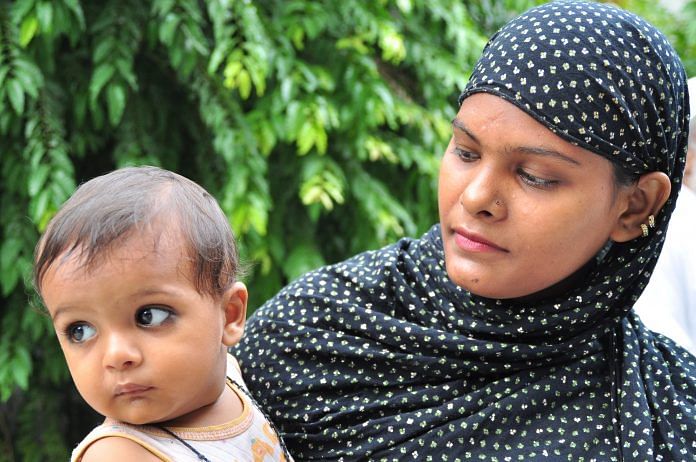While images of burqa-clad women erupting in joy flood TV channels and social media, scepticism abounds in the community.
Away from the high drama that unfolded in the Supreme Court as a constitutional bench declared the practice of triple talaq unconstitutional and illegal, and news headlines that screamed the move as a watershed moment for Muslim women, there was a feeling of despondency in Nizamuddin Basti in the capital.
“If we follow the secular state, then we will become sinners in the eyes of God,” said Aafroz Jamala, a resident of the basti. At least she had heard of the court order. Others were not even aware that the verdict was due Tuesday.
“It is only the NGO-type women who are following this closely,” says Raees Khan. “Marriage doesn’t take place in court. It takes place in front of qazis. Then how can divorce take place in courts,” asks Rashida Begum.
While images of burqa-clad women erupting in joy are flooding television channels and social media, scepticism abounds in the community. “Some women think Narendra Modi is their hero, they are being misled,” says Mohammad Muinuddin, an imam in a nearby mosque. “So many Indian women are abandoned by their husbands with children to fend for without being divorced. What about them,” he asks.
Some men were clear about continuing to follow Islamic law despite the court’s judgment. “For us, there is nothing above Islam,” says Raees Khan. Surprisingly, women seem to agree. “You cannot empower women so much that they go astray,” says Ruksana Begum. “Not all women are right,” adds Rashida Begum.
The sentiment is strikingly similar to the one evoked to argue against marital rape. “The institution of marriage will collapse. Women will cease to fear their husbands,” says Khan.
At a meeting of the Bharatiya Muslim Mahila Aandolan, a countrywide group of Muslim women which petitioned against triple talaq, however, women are overjoyed. “It is a historic judgment in independent India,” says BMMA’s founder Zakia Soman. The court has upheld the religious rights of Muslim women, and that is proof that we are a functional democracy, she explains.
“We have come a full-circle since Shah Bano,” says Priya Hingorani, a Supreme Court lawyer in the case, whose mother Kapila Hingorani was a petitioner in the historic Shah Bano case in the 1980s. “While we secured the right to maintenance then, we have secured the (Muslim women’s) right to equality in marriage now.”
Yet, the BMMA knows all too well that the task remains uphill. A member whose sister is a victim of the practice wonders if women who were divorced through the method of instant talaq before the SC verdict will now be able to move the court to declare it void. “What about women like my sister,” she asks Zakia.
Her fears may not be entirely unfounded. Notwithstanding the excitement over the recent hearing, several courts, including the Supreme Court, have previously adjudicated on the matter of triple talaq, calling it invalid and unconstitutional, while the practice continued unabated within the community.



